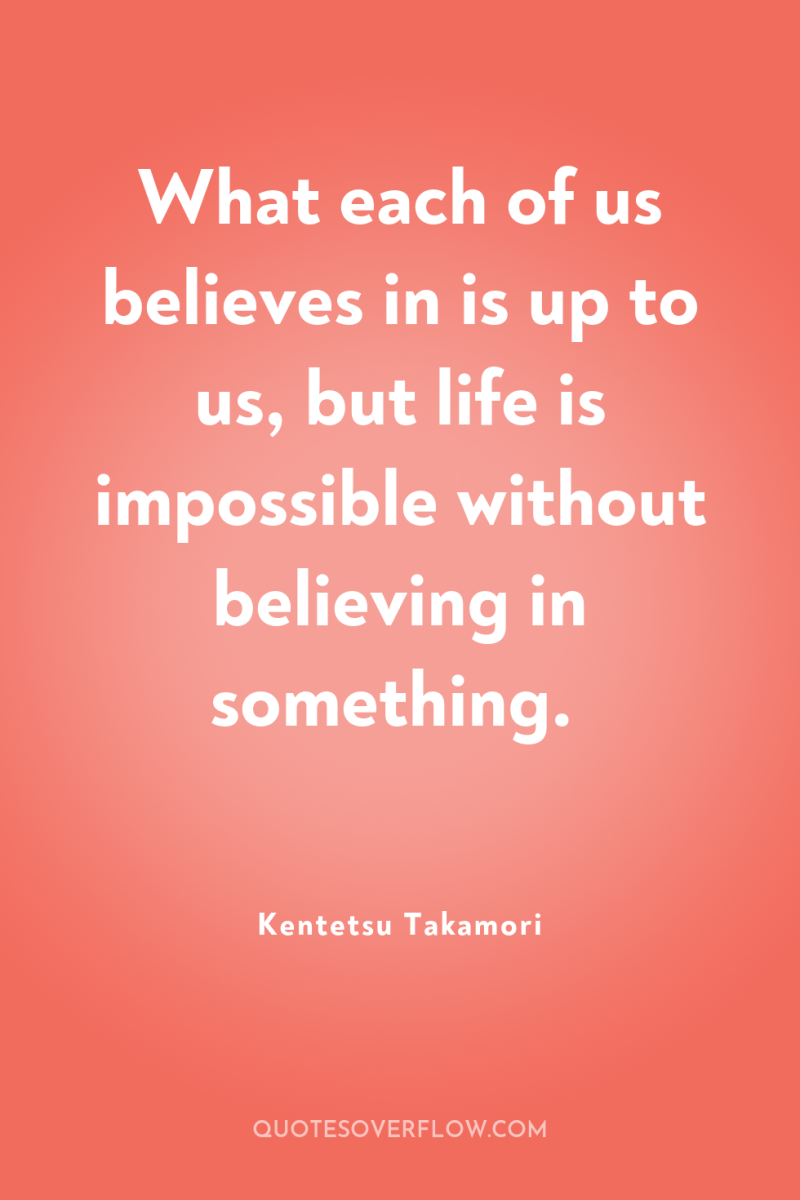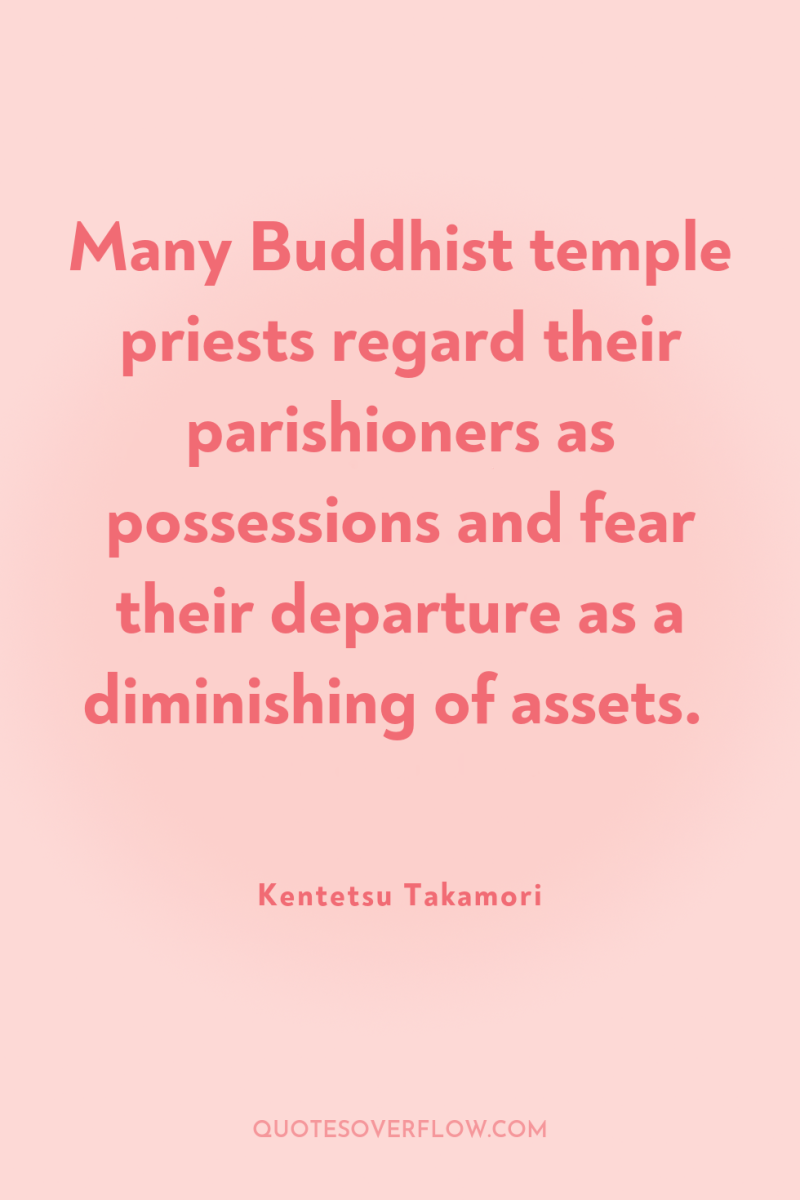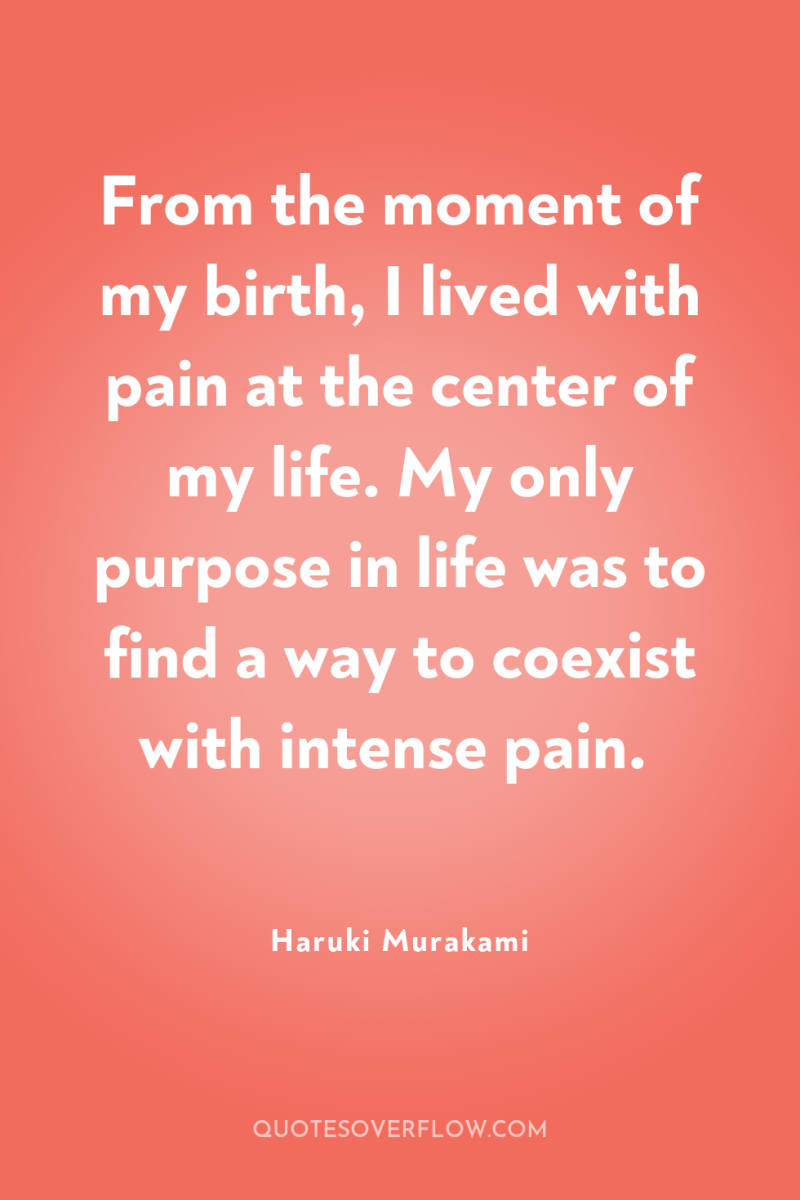
What a strange thing! to be alivebeneath cherry blossoms.Kobayashi Issa
Too lazy to be ambitious, I let the world take care of itself. Ten days' worth of rice in my bag;a bundle of twigs by the fireplace. Why chatter about delusion and enlightenment? Listening to the night rain on my roof, I sit comfortably, with both legs stretched out.Unknown
Tokyo is bigger than Kumamoto. And Japan is bigger than Tokyo. And even bigger than Japan... Even bigger than Japan is the inside of your head. Don't ever surrender yourself ― not to Japan, not to anything. You may think that what you're doing is for the sake of the nation, but let something take possession of you like that, and all you do is bring it down.Unknown
Some nonreligious people are disgruntled by the word "faith, " feeling that it has no connection to them. But we all have faith. Broadly speaking, "faith" does not apply only to belief in the supernatural. We have faith in our life, for example, believing we will live to see tomorrow, or in our health, believing we have years of healthy life ahead of us. Husbands and wives, parents and children have faith in one another.Kentetsu Takamori

What comes from the heart will go to the heartRenae LucasHall

Living in a world such as this is like dancing on a live volcano.Kentetsu Takamori
Japan likewise put her hopes of victory on a different basis from that prevalent in the United States. (...) Even when she was winning, her civilian statesmen, her High Command, and her soldiers repeated that this was no contest between armaments; it was pitting of our faith in things against their faith in spirit.Ruth Benedict

What each of us believes in is up to us, but life is impossible without believing in something.Kentetsu Takamori

Many Buddhist temple priests regard their parishioners as possessions and fear their departure as a diminishing of assets.Kentetsu Takamori
Why has pachinko swept Japan? It can hardly be the excitement of gambling, since the risks and rewards are so small. During the hours spent in front of a pachinko machine, there is an almost total lack of stimulation other than the occasional rush of ball bearings. There is no thought, no movement; you have no control over the flow of balls, apart from holding a little lever which shoots them up to the top of the machine; you sit there enveloped in a cloud of heavy cigarette smoke, semi-dazed by the racket of millions of ball bearings falling through machines around you. Pachinko verges on sensory deprivation. It is the ultimate mental numbing, the final victory of the educational system." - Lost Japan, Eng. vers., 1996 .Alex Kerr
It was Daisuke's conviction that all morality traced its origins to social realities. He believed there could be no greater confusion of cause and effect than to attempt to conform social reality to a rigidly predetermined notion of morality. Accordingly, he found the ethical education conducted by lecture in Japanese schools utterly meaningless. In the schools, students were either instructed in the old morality or crammed with a morality suited to the average European. For an unfortunate people beset by the fierce appetites of life, this amounted to nothing more than vain, empty talk. When the recipients of this education saw society before their eyes, they would recall those lectures and burst out laughing. Or else they would feel that they had been made fools of. In Daisuke's case it was not just school; he had received the most rigorous and least functional education from his father. Thanks to this, he had at one time experienced acute anguish stemming from contradictions. Daisuke even felt bitter over it. .Unknown

From the moment of my birth, I lived with pain at the center of my life. My only purpose in life was to find a way to coexist with intense pain.Haruki Murakami
[The] Japanese were a people in a profound, inverse, reverse, or if I preferred it, even perverse sense, more in love with death than living.Unknown
[The official prosecutors] ... were more vengeful on behalf of our injuries than I myself could ever be.Unknown
A feeling of liberation should contain a bracing feeling of negation, in which liberation itself is not negated. In the moment a captive lion steps out of his cage, he possesses a wider world than the lion who has known only the wilds. While he was in captivity, there were only two worlds to him; the world of the cage, and the world outside the cage. Now he is free. He roars. He attacks people. He eats them. yet he is not satisfied, for there is no third world that is neither the world of the cage nor the world outside the cage. Etsuko however, had in her heart not the slightest interest in these matters. Her soul knew nothing but affirmation. .Yukio Mishima
When I was a student, there wasn't a single thing we did that was unrelated to others. It was all for the Emperor, or parents, or the country, or society–everything was other-centered, which means that all educated men were hypocrites. When society changed, this hypocrisy ceased to work, and as a result, self-centeredness was gradually imported into thought and action, and egoism became enormously over-developed. Instead of the old hypocrites, now all we've got are out-and-out rogues. Do you see what I mean by that? .Unknown
But once I could look back on it in a calmer frame of mind, it struck me that his motive was surely not so simple and straightforward. Had it resulted from a fatal collision between reality and ideals? Perhaps–but this was still not quite it. Eventually, I began to wonder whether it was not the same unbearable loneliness that I now felt that had brought K to his decision.Unknown
But do you imagine there’s a certain type of person in the world who conforms to the idea of a ‘bad person'? You’ll never find someone who fits that mold neatly, you know. On the whole, all people are good, or at least they’re normal. The frightening thing is that they can suddenly turn bad when it comes to the crunch. That’s why you have to be careful.Unknown
The call for political freedom took place long ago. The call for freedom of speech is also a thing of the past. Freedom is not a word to be used exclusively for phenomena such as this which are so easily given outward manifestation. I believe that we young men of the new age have encountered the moment in time when we must call for that great freedom, the freedom of the mind.Unknown
Psychologically, Japanese women depend largely on each other. In their sex-segregated society, they could be criticized for living in a female ghetto, and yet they have what some American feminists are trying to build, a ”women’s culture” with its own customs, values and even language.Kittredge Cherry
We Orientals tend to seek our satisfactions in whatever surroundings we happen to find ourselves, to content ourselves with things as they are; and so darkness causes us no discontent, we resign ourselves to it as inevitable. If light is scarce, then light is scarce; we will immerse ourselves in the darkness and there discover its own particular beauty. But the progressive Westerner is determined always to better his lot. From candle to oil lamp, oil lamp to gaslight, gaslight to electric light–his quest for a brighter light never ceases, he spares no pains to eradicate even the minutest shadow. .Unknown
Your brother is a sensitive person. Aesthetically, ethically, and intellectually he is in fact hypersensitive. As a result, it would seem that he was born only to torture himself. He has none of that saving dullness of intelligence which sees little difference between A and B. To him it must be either A or B. And if it is to be A, its shape, degree, and shade of color must precisely match his own conception of it; otherwise he will not accept it. Your brother, being sensitive, is all his life walking on a line he has chosen–a line as precarious as a tight rope. At the same time he impatiently demands that others also tread an equally precarious rope, without missing their footing. It would be a mistake, though, to think that this stems from selfishness. Imagine a world which could react exactly the way your brother expects; that world would undoubtedly be far more advanced than the world as it is now. Consequently, he detests the world which is–aesthetically, intellectually, and ethically–not as advanced as he is himself. That's why it's different from mere selfishness, I think.Unknown
Most of his face had been hidden by long, greasy bangs, and he mumbled in a low voice that made him difficult to understand. From what little Kyosuke had been able to make out, Usami had killed one person, but he mostly spent his time at the podium reciting strange names that Kyousuke didn't recognize like Jeffrey Dahmer and Ed Gein... Maybe they're actors?Mizuki Mizushiro
The blue of the sky is one of the most special colors in the world, because the color is deep but see-through both at the same time.Cynthia Kadohata
Offerings gleam beneath consecrated trees, boulders, and caves where Kami nature spiritsminister to congregations of saki cans, lotus root, and the glow of tangerines; still-lives silent as prayer.Jalina Mhyana
Having a date with someone other than your ex-wife after being a married man for more than twenty five years was an important occasion alright, but wearing a tie she bought with such strong emotional value attached to it was a form of cowardice, a subconscious reluctance to let go.Vann Chow
The only difference between having an affair here and having an affair there was that the American men would always ended up losing half of his estates over a woman he was infatuated just as much as the next tramp who would come his way, while Japanese men would only earn more respect from their subordinates through the possession of much younger women, as a sign of prowess and affluence, while their wives at home, as if there were rule books distributed nationally on the “proper” marriage etiquette for all young Japanese women to read before they enter into the matrimony, would turn a blind eye on their disloyalty quietly.Vann Chow
Between the new, happy him, and the old, depressing him, there stood in the way only his lack of imagination.Vann Chow
It’s clear that if we use the mind attentively, mental power is increased, and if we concentrate the mind in the moment, it is easier to coordinate mind and body. But in terms of mind and body unity, is there something we can concentrate on that will reliably aid us in discovering this state of coordination? In Japan, and to some degree other Asian countries, people have historically focused mental strength in the hara (abdomen) as a way of realizing their full potential. Japan has traditionally viewed the hara as the vital center of humanity in a manner not dissimilar to the Western view of the heart or brain. I once read that years ago Japanese children were asked to point to the origin of thoughts and feelings. They inevitably pointed toward the abdominal region. When the same question was asked of American children, most pointed at their heads or hearts. Likewise, Japan and the West have commonly held differing views of what is physical power or physical health, with Japan emphasizing the strength of the waist and lower body and Western people admiring upper body power. (Consider the ideal of the sumo wrestler versus the V-shaped Western bodybuilder with a narrow waist and broad shoulders.) However, East and West also hold similar viewpoints regarding the hara, and we’re perhaps not as dissimilar as some might imagine. For instance, hara ga nai hito describes a cowardly person, “a person with no hara.” Sounds similar to our saying that so-and-so “has no guts, ” doesn’t it? .H.E. Davey
Your daughter's coming of age, you ought to let her see the world a little.Susumu Katsumata
In any East Asian culture, you will find that women have a very tangible power within the household. This is often rejcted by non- Asian feminists who argue that it is not real power, but. Japanese women look at the low status attributed to the domestic labor of housewives in North America and feel that this amounts to a denigration of a fundamental social role - whether it is performed by a man or a woman.Sandra Buckley
I really hope that the Japanese are going to stop demonstrating to the world what man-made radiation does to people.Steven Magee
For everything sacred has the substance of dreams and memories, and so we experience the miracle of what is separated from us by time or distance suddenly being made tangible.Yukio Mishima
The better you were able to imagine what you wanted to imagine, the farther you could flee from reality.Haruki Murakami
Oh I'm sure you're right, " Auntie said. "Probably she's just as you say. But she looks to me like a very clever girl, and adaptable; you can see that from the shape of her ears.Arthur Golden
Soon we could barely recognize them. They were taller than we were, and heavier. They were loud beyond belief. I feel like a duck that's hatched goose's eggs.Julie Otsuka
It was as if - this something I thought of only later, of course - she was gently peeling back one layer after another that covered a person's heart, a very sensual feeling.Haruki Murakami
There are some things in this world that can be done over, and some that can't. And time passing is one thing that can't be undone. Come this far, and you can't go back.Haruki Murakami
It was as if-this is something I thought of only later, of course-she was gently peeling bcd one layer after another hat covered a person's heart, a very sensual feeling.Haruki Murakami
It was as if - this something I thought of only later, of course - she were gently peeling back one layer after another that covered a person's heart, a very sensual feeling.Haruki Murakami
Hirota feels strongly drawn toward nature and the natural, is hyper-sensitive to the artificial–particularly that most cramped and constraining man-made creation, society–and does his best to avoid it.Unknown
Within two or three years of World War II's end, starvation had been basically eliminated in Japan, and yet the Japanese had continued slaving away as if their lives depend on it. Why? To create a more abundant life? If so, where was the abundance? Where were the luxurious living spaces? Eyesores dominated the scenery wherever you went, and people still crammed themselves into packed commuter trains each morning, submitting to conditions that would be fatal for any other mammal. Apparently what the Japanese wanted wasn't a better life, but more things.Unknown
We hope that general readers with an interest in Japan will find in these accounts of fieldwork a wide spectrum of illustrations of the grassroots realities of everyday life in contemporary Japanese communities, companies, institutions, and social movements.Theodore C. Bestor
If you don't have a whole lot of unsatisfied people, the economy stops dead, doesn't it?Andy Couturier
You know Americans...Self-improvement. No matter who or what we are, we're always working on ways to become somebody else.Alan Brown
It's a saying they have, that a man has a false heart in his mouth for the world to see, another in his breast to show to his special friends and his family, and the real one, the true one, the secret one, which is never known to anyone except to himself alone, hidden only God knows where.James Clavell
I should have learned many things from that experience, but when I look back on it, all I gained was one single, undeniable fact. That ultimately I am a person who can do evil. I never consciously tried to hurt anyone, yet good intentions notwithstanding, when necessity demanded, I could become completely self-centered, even cruel. I was the kind of person who could, using some plausible excuse, inflict on a person I cared for a wound that would never heal. College transported me to a new town, where I tried, one more time, to reinvent myself. Becoming someone new, I could correct the errors of my past. At first I was optimistic: I could pull it off. But in the end, no matter where I went, I could never change. Over and over I made the same mistake, hurt other people, and hurt myself in the bargain. Just after I turned twenty, this thought hit me: Maybe I've lost the chance to ever be a decent human being. The mistakes I'd committed–maybe they were part of my very makeup, an inescapable part of my being. I'd hit rock bottom, and I knew it.Haruki Murakami
If automating everything makes people lazier and lazier, and laziness leads to stupidity, which it does for most people, judging by the current content circulating the social networks everywhere, except North Korea, where they don’t have any internet to speak of - at some point the Japanese robots, for which a market niche is currently being developed, with no concerns on how they should be designed to act in society or outside it - will have no choice, but to take everything over, to preserve us from ourselves… .Will Advise
The face of self-pity was universally understood.Vann Chow
In our modern world, we look unkindly on mistakes and imperfection. But this is far from the samurai ideal. Mistakes are part of the learning process and if you haven't made them then you are, indeed, dangerous because it means you have never learned anything. Mistakes, to a samurai, are the proof of your learning.Alexei Maxim Russell
Purification in Shinto lifts the burden from the shoulders of the individual and washes it away.Stuart D.B. Picken
In a time like this, let us trust in God even more. To trust when life is easy is no trust.Joy Kogawa
Sometimes, when we are sad, we have to do the opposite of sad. Sometimes we have to sing.Daisy Whitney
In this manner , we are told, the system of the imaginary is spread circularly, by detours and returns the length of an empty subject.Roland Barthes
The Japanese have two words: "uchi" meaning inside and "soto" meaning outside. Uchi refers to their close friends, the people in their inner circle. Soto refers to anyone who is outside that circle. And how they relate and communicate to the two are drastically different. To the soto, they are still polite and they might be outgoing, on the surface, but they will keep them far away, until they are considered considerate and trustworthy enough to slip their way into the uchi category. Once you are uchi, the Japanese version of friendship is entire universes beyond the average American friendship! Uchi friends are for life. Uchi friends represent a sacred duty. A Japanese friend, who has become an uchi friend, is the one who will come to your aid, in your time of need, when all your western "friends" have turned their back and walked away.Alexei Maxim Russell
That Seigo could go into geisha houses, accept luncheon invitations, drop in at the Club, see people off at Shimabashi, meet them at Yokohama, run out to Oiso to humor the elders–that he could put in his appearance at large gatherings from morning to evening without seeming either triumphant or dejected–this must be because he was thoroughly accustomed to this kind of life, thought Daisuke; it was probably like the jellyfish's floating in the sea and not finding it salty.Unknown
Japanese universities have a chair system that is a fixed hierarchy. This has its merits when trying to work as a laboratory on one theme. But if you want to do original work you must start young, and young people are limited by the chair system. Even if students cannot become assistant professors at an early age they should be encouraged to do original work.. Industry is more likely to put its research effort into its daily business. It is very difficult for it to become involved in pure chemistry. There is a need to encourage long-range research, even if we don't know its goal and if its application is unknown. .Kenichi Fukui
Gift giving is part of the culture no matter where you are and no matter how long you stay.Christalyn Brannen
In years past, a person died, and eventually all those with memories of him or her also died, bringing about the complete erasure of that person's existence. Just as the human body returned to dust, mingling with atoms of the natural world, a person's existence would return to nothingness. How very clean. Now, as if in belated punishment for the invention of writing, any message once posted on the Internet was immortal. Words as numerous as the dust of the earth would linger forever in their millions and trillions and quadrillions and beyond.Minae Mizumura
Japan never considers time together as time wasted. Rather, it is time invested.Donald Richie
There is one thing I can say for certain: the older a person gets, the lonelier he becomes. It's true for everyone. But maybe that isn't wrong. What I mean is, in a sense our lives are nothing more than a series of stages to help us get used to loneliness. That being the case, there's no reason to complain. And besides who would be complaint to anyway? (A Walk To Kobe, Granta 124: Travel)Haruki Murakami
I bow my head submissively and see that my chest is heaving, already dotted with the telltale ï¬â€šush of sexual arousal.Donna George Storey
And so I told him how living in Japan would give him a leisure no mere tourist has, to know the rhythms of the place, a land of tiny poems.Donna George Storey
At the root of Japanese manufacturing lies a feminine delicacy and shyness as well as a childlike curiosity and fantasy-filled worldview.Morinosuke Kawaguchi
Poverty and loneliness could be seen as a liberation from strivings to become rich and popular.Donald Richie
In Japan, so many emoticons have been created that it’s reasonable to assume Japanese appreciate their convenience more than anyone else.Morinosuke Kawaguchi
One very good way to invite stares of disapproval in Japan is to walk and eat at the same time.Andrew Horvat
Girly’ products can spur Japan’s growth in this century every bit as much as, if not more than, the ‘manly’ technologies.Morinosuke Kawaguchi
The Professor noted two nymphs with strawberries on their heads, a DayGlo Amish lady, a mustachioed man in a rainbow apron. He wrote Saturday Night Fever, then crossed it out and wrote Drag Ball + Bollywood and underlined it twice.La Carmina
The memory of having sat at someone’s feet will later make you want to trample him underfoot. I’m trying to fend off your admiration for me, you see, in order to save myself from your future contempt. I prefer to put up with my present state of loneliness rather than suffer more loneliness later. We who are born into this age of freedom and independence and the self must undergo this loneliness. It’s the price we pay for these times of ours.Unknown
I wish I could see a cherry blossom or a lotus flower. Where could they be?Susumu Katsumata
After listening to a lot of these stories, I began to think that American loneliness is a completely different creature from anything we experience in this country, and it made me glad I was born Japanese. The type of loneliness where you need to keep struggling to accept a situation is fundamentally different from the sort you know you'll get through if you just hang in there.Unknown
These ideas fit the experience of these Japanese women who often talked about searching for or trying to develop "self" (jibun). Cultivating or polishing self by doing tea ceremony or being a good mother, for example, had a good connotation for the Japanese because it meant that you were trying to go beyond your narrow self and connect self with the larger world beyond social norms. But developing self in the new way these women used it meant to develop self according to just what you want to do or in a way that enhances your own possibilities in the world. Would others see choosing a life for self as selfish? These women had to maintain some ambiguity because they were wandering into dangerous territory when they wanted to travel just to enjoy themselves, or keep working and not marry. In a society that honored the cultivation of a larger self, would they themselves someday suffer for having chosen the self-centered way? .Nancy Ross Rosenberger
Reasonableness is a matter of degree. Beliefs can be very reasonable (Japan exists), fairly reasonable (quarks exist), not unreasonable (there's intelligent life on other planets) or downright unreasonable (fairies exist). There's a scale of reasonableness, if you like, with very reasonable beliefs near the top and deeply unreasonable ones towards the bottom. Notice a belief can be very high up the scale, yet still be open to some doubt. And even when a belief is low down, we can still acknowledge the remote possibility it might be true. How reasonable is the belief that God exists? Atheists typically think it very unreasonable. Very low on the scale. But most religious people say it is at least not unreasonable (have you ever met a Christian who said 'Hey, belief in God is no more reasonable than belief in fairies, but I believe it anyway! '?) They think their belief is at least halfway up the scale of reasonableness. Now, that their belief is downright unreasonable might, in fact, be established empirically. If it turned out that not only is there no good evidence of an all-powerful, all-good God, there's also overwhelming evidence against (from millions of years of unimaginable and pointless animal suffering, including several mass extinctions - to thousands of children being crushed to death or buried alive in Pakistan earthquake, etc. etc. etc.) then it could be empirically confirmed that there's no God.Would this constitute a 'proof' that there's no God? Depends what you mean by 'proof'. Personally I think these sorts of consideration do establish beyond any reasonable doubt that there is no all-powerful all-good God. So we can, in this sense, prove there's no God.Yet all the people quoted in my last blog say you cannot 'scientifically' prove or disprove God's existence. If they mean prove beyond any doubt they are right. But then hardly anything is provable in that sense, not even the non-existence of fairies. .Stephen Law
Life has a time limit. And we are changing all the time. So are our ambitions, desires, and purposes .. . The important thing is to find something that never changes in you.Fumio Obata
Constant love despite almost impossible anti-clamix towards this place of the rising sun...Alexander Zalan
Her eyes flashed, hot and angry, like lightening cutting through a red sunset.Tyffani Clark Kemp
It seems like the best escape games come from Japan for some reason. It makes me proud.Denis Markell
Minding his own business had been his motto living in a strange foreign country with a world-recognized social issue of failing morals.Vann Chow
Daisuke was of course equipped with conversation that, even if they went further, would allow him to retreat as if nothing had happened. He had always wondered at the conversations recorded in Western novels, for to him they were too bald, too self indulgent, and moreover, too unsubtly rich. However they read in the original, he thought they reflected a taste that could not be translated into Japanese. Therefore, he had not the slightest intention of using imported phrases to develop his relationship with Michiyo. Between the two of them at least, ordinary words sufficed perfectly well. But the danger was of slipping from point A to point B without realizing it. Daisuke managed to stand his ground only by a hair's breadth. When he left, Michiyo saw him to the entranceway and said, "Do come again, please? It's so lonely.Unknown
My Japanese isn’t much better today, but at least now I appreciate my duality more than when I was a punk kid.Gil Asakawa
Teaism is a cult founded on the adoration of the beautiful among the sordid facts of everyday existence.Kakuzo Okahura
Life on earth survives thanks to diversity, says Sekunda, because changing circumstances means today's winners can suddenly become tomorrow's losers. When the meteor hits, when the Green Revolution fails, when the bees unexpectedly die, the kind of anomalous diversity found in the Galapagos Islands–or in the technology of Japan–is exactly what will save us from the most dangerous failure of all: global success.Momus
Whereas, in the west, individuality and drive are considered positive qualities, they are not seen the same way, in Japan. In that country, if you are too much of a rugged individualist, it might actually indicate that you are a weak, unreliable character and that you are selfish, in a childish, willful kind of way.Alexei Maxim Russell
Japan is the first nation in the world to accord 'comic books'--originally a 'humorous' form of entertainment mainly for young people--nearly the same social status as novels and films.Frederik L. Schodt
Shigemori's body of work is a compelling manifesto for continuous cultural renewal.Christian Tschumi
From New Year's Eve through the third of January, the streets of Tokyo grew quiet, as if all the people had disappeared.Shogo Oketani
The physical impact of taiko music, along with the sheer visual poetry of a choreographed ensemble presenting its music in perfect synchrony, is so powerful and inviting that taiko is beginning to catch on as Japan's most influential and lasting gift to world music.Gil Asakawa
Truly a good horse, good ground to gallop on, and sunshine, make up the sum of enjoyable travelling.Isabella L. Bird
The secret to making yourself stronger is to absorb the strength of the people around you–energy begets energy.Adachi Zenko
I’m very headstrong. Once I’ve caught fire, there’s no dousing the flames–all engines full speed ahead.Adachi Zenko
Comics are drawings, not photographs, and as such they present a subjective view of reality.Frederik L. Schodt
The new fans of Japan won’t be Orientalists, but they will be anime-savvy.Morinosuke Kawaguchi
Japanese had never seen a Western-style circus, and most of them had probably never seen foreigners, either.Frederik L. Schodt
In spite of what most assume, it is surprisingly tough to make the mind and body work together as a unit.H.E. Davey
In Japanese swordsmanship, it is not uncommon to speak of a unity of mind, body, and sword.H.E. Davey
He did not care about titles and was proud to be a farmer beyond all else.Tsuneichi Miyamoto
Every once in a while she'll get worked up and cry like that. But that's ok. She's letting her feelings out. The scary thing is not being able to do that. Then your feelings build up and harden and die inside. That's when you're in big trouble.Haruki Murakami
If God's love encompasses the whole world and if everyone who does not believe in him will perish, then surely this question needs to be asked: When, after two thousand years, does God's plan kick in for the billion people he 'so loves' in China? Or for the 840 million in India? Or the millions in Japan, Afghanistan, Siberia, Egypt, Burma ·. and on and on? Why would a God who 'so loved the world' reveal his message only to a tiny minority of the people on earth, leaving the majority in ignorance? Is it possible to believe that the Father of all Mankind would select as his Chosen People a small Middle Eastern nation, Israel, reveal His will exclusively to them, fight alongside them in their battles to survive, and only after their failure to reach out to any other group, update His plan for the world's salvation by sending His 'only begotten son, ' not to the world but, once again, exclusively to Israel? .Charles Templeton
...I was not prepared for the feel of the noodles in my mouth, or the purity of the taste. I had been in Japan for almost a month, but I had never experiences anything like this. The noodles quivered as if they were alive, and leapt into my mouth where they vibrated as if playing inaudible music.Ruth Reichl